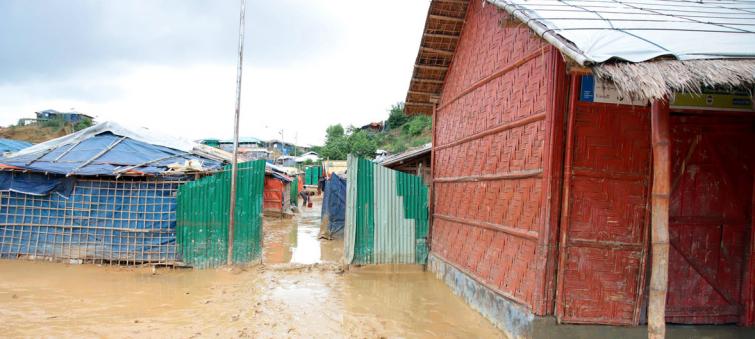
Scores of Rohingya refugee shelters in Bangladesh destroyed by flooding
New York, July 6 (IBNS): Heavy monsoon rains in Bangladesh have drenched the Cox’s Bazar settlement, home to more than 900,000 Rohingya refugees, destroying some 273 shelters, and injuring 11 people, the UN refugee agency, UNHCR, said on Friday. The huge refugee camp has been hit by three days of non-stop rain, and more heavy downpours are expected throughout next week, with four months of the monsoon season still to go.
Refugees volunteers assist in emergency relief
Refugee volunteers trained by UNHCR and partners, worked throughout the night on Wednesday in heavy rain, to help families in urgent need. In some cases, this involved rescuing refugees from shelters destroyed by the 26 reported landslides.
Around 2,137 people have been relocated, either because their shelters have suffered substantial damage, or as a precaution, and emergency supplies are being distributed to help rebuild, repair and strengthen damaged shelters.
Preparations for the monsoon season in Cox’s Bazar have included building retaining structures on hillsides, installing drainage, and building roads and bridges. Reservoirs have been also constructed to hold monsoon rains and stabilise water supplies.
Since January, some 21,000 refugees have been employed each month by the UN’s World Food Programme (WFP), under a cash for work scheme, assisting disaster risk reduction and engineering work designed to make the camps safer, including the stabilisation of slopes.
Situation in Cox’s Bazar ‘remains critical’
At a press briefing at the UN Office in Geneva on Friday, WFP spokesperson Herve Verhoosel said that this year, UN agencies and NGOs will complete reforestation work across more than 200 hectares of the camps, which will help to stabilise the land and reduce the risk of landslides. WFP is responsible for around 40% of the reforestation, with technical inputs from the UN Food and Agriculture Organization, FAO.
Food stocks for thousands of refugees in Cox’s Bazar have been damaged by the flooding, said Mr. Verhoosel. WFP has been providing 4,889 people with high energy biscuits and hot meals, and has enough supplies to feed more than 160,000 people in an emergency.
He added that almost two years after the 2017 influx of Rohingya in Bangladesh, the situation remains critical. The refugees remain highly vulnerable to food insecurity and the situation would rapidly deteriorate if humanitarian assistance were to cease or decrease: “It costs WFP US$24 million every month to feed almost 900,000 refugees and, without continued support from the international community, the situation for these refugees would become increasingly dire.”
WFP/Gemma Snowdon
Support Our Journalism
We cannot do without you.. your contribution supports unbiased journalism
IBNS is not driven by any ism- not wokeism, not racism, not skewed secularism, not hyper right-wing or left liberal ideals, nor by any hardline religious beliefs or hyper nationalism. We want to serve you good old objective news, as they are. We do not judge or preach. We let people decide for themselves. We only try to present factual and well-sourced news.







